 I’m teaching AP World History for the first time this year, and it’s been… a fascinating challenge.
I’m teaching AP World History for the first time this year, and it’s been… a fascinating challenge.
Fortunately, I’ve been in and around the world of AP and Pre-AP for nearly two decades, and I’m blessed to know several amazing APWH teachers and consultants – all of whom share generously and encourage unceasingly. There’s more of a learning curve than I care to admit, but that doesn’t mean I don’t enjoy it immensely.
Most days.
I have 93 students spread out over four sections. (I know, right? Fewer than a hundred kids on my roster – I didn’t think such things were possible.) I’m surrounded by experienced teachers who are supportive but see little reason to tiptoe when it comes to asking questions or making observations – my kinda people. My district has been struggling, at least according to those widely publicized test scores the state keeps pushing, but I see its heart and the talent gathered here, and I am at home.
Takin’ It To Dilemma
It’s in that context that I periodically find myself in something of a philosophical dilemma. See, AP is by design a more-or-less college level course. It certainly moves at a ridiculous pace, and students are responsible for an insane amount of information – most of which they’re expected to read, view, or otherwise digest on their own so we can focus on critical thinking, document analysis, and other essential skills in class. That’s without a doubt been the number one challenge for both them and me – keeping up with the content. It feels some weeks like I’ve left them to learn the material all on their own while I torture them in class with things like making good inferences or identifying points of view.
For most of them, this is their first AP class of any kind. I have a handful of juniors and seniors, but the bulk of my darlings are freshmen and sophomores. Many are strong enough students coming in, but plenty of others signed up primarily to qualify for one of the eleventeen different flavors of high school diploma the state delineates; several require advanced coursework to get the shiny sticker at the bottom. There’s no Pre-AP program here to speak of – yet – so this is in many ways a whole new world for them.
That gives us something in common, at least.
Thus my philosophical dilemma. Yes, – it’s a college-level course. Yes, there’s a big ol’ scary AP Exam coming up sooner than it seems. I absolutely want to do everything in my power to push them to their lil’ limits, prepare them for the exam, and lay the groundwork for them to do well in subsequent AP or other advanced classes, and in college, and in life. It is without a doubt time to don their big kid panties and suck it up – we’re in HIGH. SCHOOL. NOW.
But see, that’s just it – they’re in high school now. Not college, not a career, not the post-secondary something or other for which we’re trying to prepare them. High school. Getting ready for those things, but not yet doing those things.
Therein lies the dilemma. Every teacher faces it in some form or another – sometimes daily. How much do I push, and how much do I bend? When do I draw hard lines, figuring that’s what’s best for my little cherubs in the long run, and when do I adjust based on the situation, the need, the individual, hesitating to put the rules ahead of the relationships?
It’s tricky even if we set aside the touchy-feely stuff. Sure, I love them dearly most days, and that’s part of the gig, but the answers don’t suddenly become clear when we prioritize the purely academic aspects of the equation. I know they need to practice independent reading and note-taking skills; they beg for questions, outlines, or something I can give them on paper so they’ll know what content matters most. I organize interactive small-group discussions and activities, which work well enough; they want me to lecture more and insist it helps them understand stuff when they’re later reading on their own.
We’re starting formal written arguments in a few weeks, but we’ve also colored. We’re still digging through primary source texts, but today we watched a musical parody video about the Black Death as a self-check on content (if you understand all of the references, you’re probably good to go on the Plague; if not, you might need to brush up). I have no idea if I’m doing it all “right,” but I’m genuinely trying to balance the demands and guiding purpose of the course with the dynamics and practical limitations of my kids – and sometimes myself.
And that’s OK. It has to be. (Whatever you’re doing is too, by the way. Those folks on the tweeter-blogs making sweeping pronouncements about what should or shouldn’t be done in every classroom for every kid in every situation can kiss my curriculum. Lay off the pompous teacher-shaming and go flip your classroom or something. Sorry, do I sound bitter?)
The Mayans and Groundhog Day
It’s in that spirit that I’m trying something stupid this week. Or brilliant. Maybe both. I finally snagged a classroom set of laptops for classroom use, and we’re going to break up the routine for a few days.
I’m giving my students a list of major and semi-major holidays from which to choose, and an organizational table to complete as they research each. While a few are uniquely American, most have roots much further back in history and have evolved over the centuries. Students will explore those roots and that evolution, zoom in on some of the rituals or customs associated with each, and – here’s the World History Part – try to make sense of it all in relation to the cultures from whence they sprang,
If the AP gods smile upon us, they’ll also be able to trace how some of these rituals and customs have evolved from century to century and place to place. Presumably those changes reflect aspects of the times and places in which they occur. A secondary goal is to determine the reliability of various online sources for this sort of thing – holiday legends tend to be ripe with after-the-fact sentimentality and artificial OMG.
I know, I know – it sounds a little elementary on the surface. I’m hoping I’ve structured it enough so that it’s not. It has the potential to be ultra-productive – both in terms of engagement and in making connections between customs and cultures, between history and traditions. Not to go all crazy or anything, but what if they’re able to identify change and continuity over time, similarities and differences between cultures, or other baby steps towards legit historical skills and AP-level thinking?! LET THE LEARNING BEGIN!!!
Or, this might very well waste two hours of their lives they’ll never get back. That’s also a very real possibility.
On Day Two, they’ll be given the option to compare and contrast two of the holidays in terms of the information they’ve gathered in some yet-to-be-determined format, OR to compose for publication an article / blog post about one of their chosen holidays. I may offer a third option of simply adding a few more holidays for students who may not have more than that to give at this point; just between you and me, I’m waiting to see how Day One goes before finalizing that part.
I’m hoping many of them try the blog post / article. Like with the initial tables, there are guidelines and requirements and hoops through which to jump, but I’ve tried to leave them some creative freedom on exactly how to do it. I realize that edu-bloggers far more popular than I would insist in stuffy tones that I shouldn’t crush students’ personal learning journeys with things like word counts or formatting expectations, but I’ve met them and with all due respect, sometimes fences often set us free.
Assuming it actually happens, my plan is to then post the results for you and anyone else I can virtually round up to read and offer comments – good stuff, bad stuff, thoughts and suggestions, etc. I’m pretty sure that’s a trendy edu-thing to do these days – “authentic audiences” and all that – but mostly I just think it would be nifty keen and get them a better variety of feedback than I could provide alone.
Thanks in advance for helping with that, by the way. I’ll let you know when they’re posted.
Reflections
I have no idea what to expect. As I type this, I should already be showering and on my way. With my writing time so limited these days, I’m often trading pithy commentary for pedagogical transparency and personal reflection. Hopefully some of you will find my periodic bewilderment and perpetual self-doubt either comforting or amusing in some way.
I certainly do.
I’ll post the actual instructions soon and let you know how it goes. In the meantime, Comments are always welcome below – except for you bots at the essay-writing service or selling the Russian sex dolls. Seriously, people – I don’t have time to monitor that stuff right now!
On that note, go change the world. Thanks for staying with me on this ride. You are needed, now more than ever.
RELATED POST: A Whole New (AP) World…
RELATED POST: Am I Teaching To The Test?

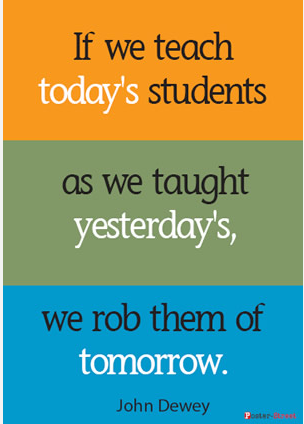 It’s funny the things that make us uncomfortable.
It’s funny the things that make us uncomfortable. In the midst of the chaos, we’ve introduced “World History” and what it means to add “AP” to the beginning. I’ve crammed in a few lectures, some jigsaw reading, a pretty big discussion about foundational themes – all while trying to get to know my kids enough to be effective in a new subject in a new place in a new reality stream.
In the midst of the chaos, we’ve introduced “World History” and what it means to add “AP” to the beginning. I’ve crammed in a few lectures, some jigsaw reading, a pretty big discussion about foundational themes – all while trying to get to know my kids enough to be effective in a new subject in a new place in a new reality stream. My ears eventually picked up the subtle scribbling of little mechanical pencils, and the periodic turning of pages. After what must have been seventeen or eighteen hours, a young lady leaned over to her tablemate and pointed to something in the text, whispering an apparent inquiry. Her cohort considered whatever she’d said, then nodded and gave a brief response which seemed to satisfy her. They both then continued doing this… this… horrifying “old way” schoolness.
My ears eventually picked up the subtle scribbling of little mechanical pencils, and the periodic turning of pages. After what must have been seventeen or eighteen hours, a young lady leaned over to her tablemate and pointed to something in the text, whispering an apparent inquiry. Her cohort considered whatever she’d said, then nodded and gave a brief response which seemed to satisfy her. They both then continued doing this… this… horrifying “old way” schoolness.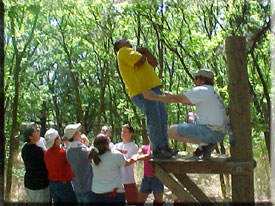 If you’ve taught for any length of time, you’ve endured endless PD days, videos, handouts, faculty presentations, and perhaps even a horrible skit or two, built around three basic assumptions: (a) all teachers used to suck in every possible way, providing endless “before” examples, (b) most current teachers have no idea how to work with young people and probably don’t even like them very much, usually because of our cultural insensitivity, and (c) if we don’t embrace {insert trendy strategy here}, we’ll continue to suck and most likely destroy the future.
If you’ve taught for any length of time, you’ve endured endless PD days, videos, handouts, faculty presentations, and perhaps even a horrible skit or two, built around three basic assumptions: (a) all teachers used to suck in every possible way, providing endless “before” examples, (b) most current teachers have no idea how to work with young people and probably don’t even like them very much, usually because of our cultural insensitivity, and (c) if we don’t embrace {insert trendy strategy here}, we’ll continue to suck and most likely destroy the future. So I’d like to assure all of the baby teachers out there, and remind some of the veterans, that all instructional and classroom management advice – the pedagogy, the brain research, the anecdotes, the activities – are (or should be) about giving you ideas. Options. Tools. Challenging you, or inspiring you. Maybe shaking you up or forcing you to question how you do things from time to time.
So I’d like to assure all of the baby teachers out there, and remind some of the veterans, that all instructional and classroom management advice – the pedagogy, the brain research, the anecdotes, the activities – are (or should be) about giving you ideas. Options. Tools. Challenging you, or inspiring you. Maybe shaking you up or forcing you to question how you do things from time to time. Question your methods, absolutely. Challenge your perceived results. Be transparent with your co-workers in considering ways to be more effective. Don’t be insecure and stuck in the mythical, dark “ancient ways.”
Question your methods, absolutely. Challenge your perceived results. Be transparent with your co-workers in considering ways to be more effective. Don’t be insecure and stuck in the mythical, dark “ancient ways.”

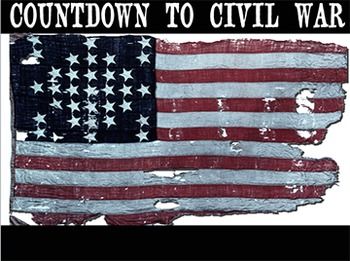
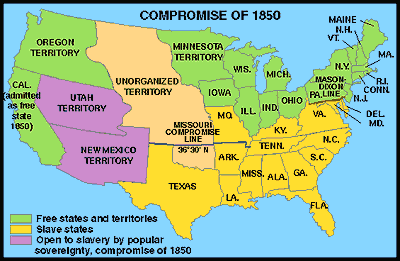 On January 29, 1850, Henry Clay proposed the Compromise of 1850 to Congress. It was a collection of five bills he said would help prevent further conflict between the North and the South. Texas gave up its claims to New Mexico and other areas north of the Missouri Compromise line and the U.S. took over their remaining debts. California was admitted to the Union as a free state. Utah and New Mexico would enter the U.S. under the principal of ‘popular sovereignty’ – meaning the people in each would vote for whether or not to have slavery. The slave trade, but not slavery itself, was banned in the District of Columbia. A much tougher Fugitive Slave Act was enacted.
On January 29, 1850, Henry Clay proposed the Compromise of 1850 to Congress. It was a collection of five bills he said would help prevent further conflict between the North and the South. Texas gave up its claims to New Mexico and other areas north of the Missouri Compromise line and the U.S. took over their remaining debts. California was admitted to the Union as a free state. Utah and New Mexico would enter the U.S. under the principal of ‘popular sovereignty’ – meaning the people in each would vote for whether or not to have slavery. The slave trade, but not slavery itself, was banned in the District of Columbia. A much tougher Fugitive Slave Act was enacted. 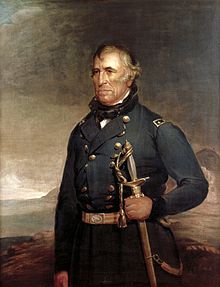 President Zachary Taylor died unexpectedly in July of 1850 of what seemed to be a stomach-related illness. Some suggested he may have been assassinated by pro-slavery southerners, and various theories have persisted into modern times. In 1991, Taylor’s body was exhumed and tests were done in an effort to determine whether or not he had, in fact, been poisoned. The science found no evidence of malicious behavior, but some question the results even today.
President Zachary Taylor died unexpectedly in July of 1850 of what seemed to be a stomach-related illness. Some suggested he may have been assassinated by pro-slavery southerners, and various theories have persisted into modern times. In 1991, Taylor’s body was exhumed and tests were done in an effort to determine whether or not he had, in fact, been poisoned. The science found no evidence of malicious behavior, but some question the results even today. 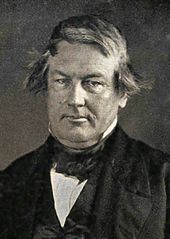 On July 10, 1850, Millard Fillmore was sworn into office as the 13th President of the United States. Neither expansionists nor slave-holders were generally happy with his publicly stated policies regarding slavery, although it would be wrong of me to try to speak for them or evaluate their reasoning.
On July 10, 1850, Millard Fillmore was sworn into office as the 13th President of the United States. Neither expansionists nor slave-holders were generally happy with his publicly stated policies regarding slavery, although it would be wrong of me to try to speak for them or evaluate their reasoning.  On September 11, P.T. Barnum introduced Jenny Lind to American audiences. Often called the “Swedish Nightingale,” Lind was a soprano who performed in Sweden and across Europe before her wildly popular concert tour of America. She donated many of her earnings to charities, especially the endowment of free schools in Sweden. Some people think that sort of philanthropy is noble; others find it less so. Best we not consider such issues here. Or the role of the arts in influencing culture or character.
On September 11, P.T. Barnum introduced Jenny Lind to American audiences. Often called the “Swedish Nightingale,” Lind was a soprano who performed in Sweden and across Europe before her wildly popular concert tour of America. She donated many of her earnings to charities, especially the endowment of free schools in Sweden. Some people think that sort of philanthropy is noble; others find it less so. Best we not consider such issues here. Or the role of the arts in influencing culture or character. On August 22, 1851, a yacht named “America” won the first America’s Cup yach race, as things named “America” always should. This may have had an impact on different segments of the nation, or it may not have.
On August 22, 1851, a yacht named “America” won the first America’s Cup yach race, as things named “America” always should. This may have had an impact on different segments of the nation, or it may not have. December 1851 – The first Y.M.C.A. opens in Boston, Massachusetts. This arguably reflected changing values and social strategies in northern cities – if we were going to talk about values, I mean. Which we won’t. Because… school. So, um… the Village People recorded “Y.M.C.A.” in 1978 and it became a huge disco hit. If you’ve ever been to a live sporting event, you’ve heard this song and watched people do weird things with their arms which they seem to think are related to the song.
December 1851 – The first Y.M.C.A. opens in Boston, Massachusetts. This arguably reflected changing values and social strategies in northern cities – if we were going to talk about values, I mean. Which we won’t. Because… school. So, um… the Village People recorded “Y.M.C.A.” in 1978 and it became a huge disco hit. If you’ve ever been to a live sporting event, you’ve heard this song and watched people do weird things with their arms which they seem to think are related to the song. 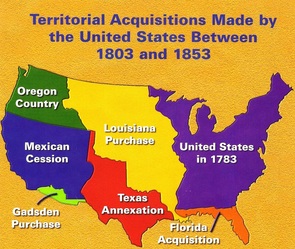 1853 – America and Mexico signed the Gadsden Treaty. Vice President William King died. Arctic explorer Elisha Kane ventures farther north than any man has before.
1853 – America and Mexico signed the Gadsden Treaty. Vice President William King died. Arctic explorer Elisha Kane ventures farther north than any man has before.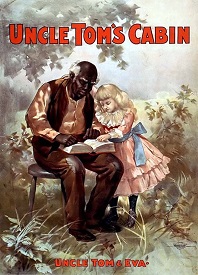

 Statistics say, in fact, that you’re probably pretty good. Once you control for poverty and upbringing and factors well-beyond your control, the reality is that most American public school teachers are at least adequate, and many are quite impressive much of the time. If this is your first year, you’re probably not as good as you will be in two more; if this is your twentieth, it’s possible you’ve lost some of the passion of your first fifteen. But overall, I suspect you’re a miracle worker every day and simply don’t see it.
Statistics say, in fact, that you’re probably pretty good. Once you control for poverty and upbringing and factors well-beyond your control, the reality is that most American public school teachers are at least adequate, and many are quite impressive much of the time. If this is your first year, you’re probably not as good as you will be in two more; if this is your twentieth, it’s possible you’ve lost some of the passion of your first fifteen. But overall, I suspect you’re a miracle worker every day and simply don’t see it.
 18% failed their common assessment; what can YOU do differently? Absenteeism is up; what can YOU do better? Some demographics are being disciplined out of proportion to others; what are YOU doing wrong? How can YOU reach more kids? How can YOU solve more problems? How can YOU meet more needs? What are YOU doing to modernize or personalize or gamify your curriculum? Why did YOU give little Bobo that ‘F’? How can YOU get more parents involved? What are YOU doing about global warming? Nuclear disarmament? World hunger? Transgender issues? That one computer mouse that keeps getting stuck? WHY HAVEN’T YOU FIXED IT ALL YET?!?!
18% failed their common assessment; what can YOU do differently? Absenteeism is up; what can YOU do better? Some demographics are being disciplined out of proportion to others; what are YOU doing wrong? How can YOU reach more kids? How can YOU solve more problems? How can YOU meet more needs? What are YOU doing to modernize or personalize or gamify your curriculum? Why did YOU give little Bobo that ‘F’? How can YOU get more parents involved? What are YOU doing about global warming? Nuclear disarmament? World hunger? Transgender issues? That one computer mouse that keeps getting stuck? WHY HAVEN’T YOU FIXED IT ALL YET?!?! You keep finding ways to make it work. You keep finding ways to reach as many as you can. When you can’t, it’s not because you suck – it’s because the system simply isn’t set up in a way that benefits most kids individually – it’s set up in the cheapest way possible that still kinda teaches kids in bulk.
You keep finding ways to make it work. You keep finding ways to reach as many as you can. When you can’t, it’s not because you suck – it’s because the system simply isn’t set up in a way that benefits most kids individually – it’s set up in the cheapest way possible that still kinda teaches kids in bulk. 
 But you don’t have to suck – not going forward. You’ve had the training, you have (or had) the ideals, you know kinda how it’s supposed to work. So fix it. Try something different. Consult trustworthy peers in your building and ask what’s working for them. Find that administrator who’s not a jerk and let them know you’re looking for ways to improve – they LOVE that stuff.
But you don’t have to suck – not going forward. You’ve had the training, you have (or had) the ideals, you know kinda how it’s supposed to work. So fix it. Try something different. Consult trustworthy peers in your building and ask what’s working for them. Find that administrator who’s not a jerk and let them know you’re looking for ways to improve – they LOVE that stuff. 
 I’m a bad person.
I’m a bad person. Don’t get me wrong – it’s just peachy keen swell that throwing a few computers in the middle of an impoverished village and making sure no teachers interfere practically guarantees a bunch of eight-year olds will master calculus, cure cancer, and reverse climate change. Here’s to the success of every one of those dusty darlings and even newer, bigger opportunities for them to challenge themselves AND the dominant paradigm. Seriously.
Don’t get me wrong – it’s just peachy keen swell that throwing a few computers in the middle of an impoverished village and making sure no teachers interfere practically guarantees a bunch of eight-year olds will master calculus, cure cancer, and reverse climate change. Here’s to the success of every one of those dusty darlings and even newer, bigger opportunities for them to challenge themselves AND the dominant paradigm. Seriously. Maybe it would be better to do the entire building… eleven hundred freshmen set free to learn with a bank of Dells and no silly adults with their stifling expectations. Imagine the money saved on staff – and computers never take personal days or violate professional dress code!
Maybe it would be better to do the entire building… eleven hundred freshmen set free to learn with a bank of Dells and no silly adults with their stifling expectations. Imagine the money saved on staff – and computers never take personal days or violate professional dress code! I’m not unsympathetic. I get what these writers and speakers are going for. Most are trying to make the very valid point that when we try to cram kids’ heads full of 87-pages of curriculum standards compiled by committees and approved by states to be tested by bubbles, we are unlikely to either fill their buckets OR light their fires.
I’m not unsympathetic. I get what these writers and speakers are going for. Most are trying to make the very valid point that when we try to cram kids’ heads full of 87-pages of curriculum standards compiled by committees and approved by states to be tested by bubbles, we are unlikely to either fill their buckets OR light their fires. It’s not. Remember that Oregon Trail game we were all so excited about a few decades ago? That’s still about as cutting edge as educational games have managed, and that’s not even what most virtual learning is attempting.
It’s not. Remember that Oregon Trail game we were all so excited about a few decades ago? That’s still about as cutting edge as educational games have managed, and that’s not even what most virtual learning is attempting.  There are glaring problems with this system, some within the school’s control and many more without. The biggest problem with the current model is also the most substantial barrier to all this self-directed learning we keep hearing will save us all – state legislatures dictate most of what’s supposed to be “important” and decide how these things will be assessed.
There are glaring problems with this system, some within the school’s control and many more without. The biggest problem with the current model is also the most substantial barrier to all this self-directed learning we keep hearing will save us all – state legislatures dictate most of what’s supposed to be “important” and decide how these things will be assessed.